Healing City Soils 2019 Update
August 29, 2019
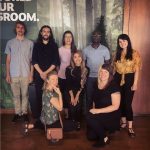
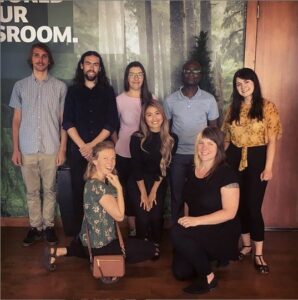
August 29, 2019


July 19, 2019
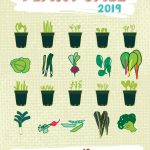
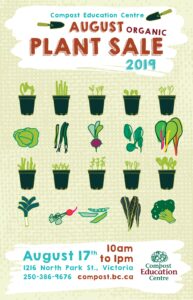
Missed the window in June and July to seed your winter vegetable garden? Not to worry, we’re hosting our 8th annual August Organic Plant sale so you can still have fresh greens and herbs throughout the winter!
The plant sale will be held Saturday, August 17th from 10am to 1pm on the street outside the CEC (1216 North Park Street). Gardeners can expect to find a wide selection of plants for fall and winter growing and harvest including kale, broccoli, cabbages, collards, arugula, cold hardy lettuces, herbs like cilantro and parsley, and many others. Local, organic farmers are:
Ravensong Seeds
Saanich Organics
The Compost Education Centre
Metchosin Farm
Cam Kidd with Perennials, and Mushroom Spawn
Haliburton Farm
and more!
No need to register for this event but feel free to call our office at 250 386 9676 or contact us via email at office at compost.bc.ca if you have any questions.
Posted in NewsMay 10, 2019
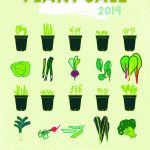
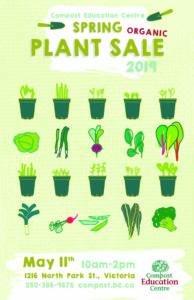
The Compost Education Centre (CEC) is hosting our 16th annual all-organic spring plant sale! The event is on Saturday May 11th, 10am-2pm at the CEC demonstration site at 1216 North Park Street. The Spring Organic Plant Sale features local farmers offering a wide variety of organically grown vegetable, flower and herb seedlings to get you off to a successful start this growing season.
What you can look forward to:
• The largest selection of organically grown heirloom tomato varieties all in one place for easy shopping
• Organically grown vegetable starts from arugula to zucchini
• Native plants for your low maintenance garden
• Perennial edibles like berry bushes and other fruiting shrubs
• Medicinal herbs like English lavender, chamomile and yarrow
• Culinary herbs like Genovese basil, dill and chives
• Companion plants like marigolds, sweet cicely and comfrey
• Live music!
2019 VENDORS:
Saanich Organics
Metchosin Farm
Growceries
Mason Street City Farm
Ravensong
Organic Gardener’s Pantry
Haliburton Farm
Crooked Fir Farm & Nursery
Community Garden Growers
Cam Kidd
The Compost Education Centre
Posted in NewsAugust 10, 2018
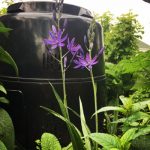
Though composting can be a pretty basic process once you understand the fundamentals, there’s bound to be a few hiccups along the way. In this video, Site Manager and Adult Education Coordinator, Alysha Punnett, shows us how to tackle the invasion of wandering roots in a compost bin.
Posted in NewsJuly 28, 2018
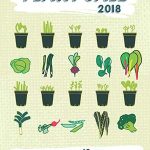
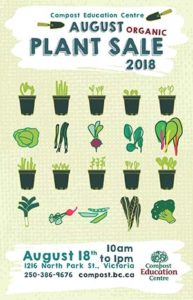
Saturday, August 18th, from 10am-1pm
Missed the window in June and July to seed your winter vegetable garden? Not to worry, we’re hosting our 7th annual August Organic Plant sale so you can still have fresh greens and herbs throughout the winter!
The plant sale will be held Saturday, August 18th from 10am to 1pm on the street outside the CEC (1216 North Park Street). Gardeners can expect to find a wide selection of plants for fall and winter growing and harvest including kale, broccoli, cabbages, collards, arugula, cold hardy lettuces, herbs like cilantro and parsley, and many others. Local, organic farmers are:
The Organic Gardener’s Pantry
Ravensong Seeds
Saanich Organics
The Compost Education Cetnre
Metchosin Farm
and more!
No need to register for this event but feel free to call our office at 250 386 9676 or contact us via email at office at compost.bc.ca if you have any questions.
Posted in NewsMay 2, 2018
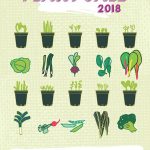
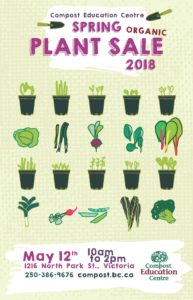
The Compost Education Centre (CEC) is hosting our 16th annual all-organic spring plant sale! The event is on Saturday May 12th, 10am-2pm at the CEC demonstration site at 1216 North Park Street. The Spring Organic Plant Sale features local farmers offering a wide variety of organically grown vegetable, flower and herb seedlings to get you off to a successful start this growing season.
What you can look forward to:
• The largest selection of organically grown heirloom tomato varieties all in one place for easy shopping
• Organically grown vegetable starts from arugula to zucchini
• Native plants for your low maintenance garden
• Perennial edibles like berry bushes and other fruiting shrubs
• Medicinal herbs like English lavender, chamomile and yarrow
• Culinary herbs like Genovese basil, dill and chives
• Companion plants like marigolds, sweet cicely and comfrey
• Live music!
2018 VENDORS:
Saanich Organics
Metchosin Farm
Growceries
New Mountain Farm
Mason Street City Farm
Hatchet & Seed
Ravensong
Saanich Native Plants
Organic Gardener’s Pantry
Crooked Fir Farm & Nursery
Posted in NewsDecember 14, 2017
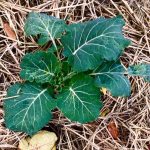
Winter Growing, written by our Site Manager, Alysha Punnett and published by the NRG online publication.
Posted in News